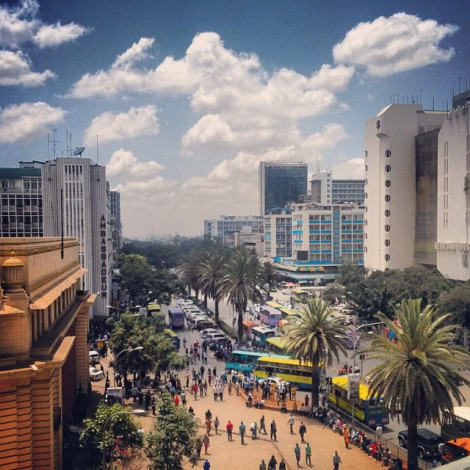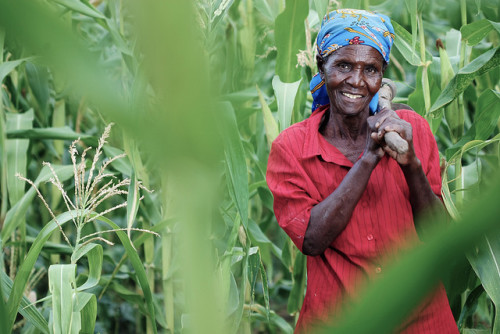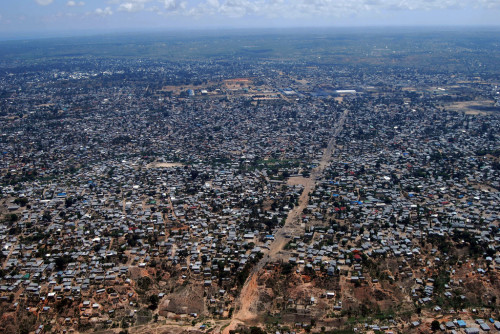By Jacob Kushner April 5, 2016

Downtown Nairobi, Kenya, as viewed from the Africa Nazarene University © dan lundmark
Two years ago, Michael Bloomberg launched Bloomberg Media Initiative Africa, a $10 million fund to “build media capacity, convene international leaders and improve access to information” on the continent. As part of the three-year program, journalists in Kenya, South Africa and Nigeria can apply for training programs and seminars to improve their knowledge about African finance and how to cover it.
Bloomberg believes that the story of Africa’s economic development is woefully under-covered. The organization wanted to give journalists the tools to use a more data-driven approach to business stories and to fill some of the gaps in context that, editors say, plague local reporting. It also wants to create a pipeline of journalists for its own operation.
Truly independent media outlets remain scarce on the continent. Freedom House lists the press in Kenya, Nigeria and South Africa as only “partially free.” The first and fourth most censored media in the world are in Africa, according to the Committee to Protect Journalists, which last year published a detailed report about how Kenyan officials and partisan media owners are eroding press freedom there.
To learn more about the initiative and its relevance for African business journalism, CoveringBusiness spoke with three veteran Bloomberg editors. Matthew Winkler is Editor in Chief Emeritus of Bloomberg, co-founder of Bloomberg News and has served on the board of the Knight-Bagehot Fellowship Program at Columbia University. Antony Sguazzin is Bloomberg’s Managing Editor for Sub-Saharan Africa, based in Johannesburg. Erana Stennett is the BMIA Programme Director. They say so far employers have found that graduates of the program are better reporters, but that it’s too soon to say whether the program will achieve some if its broader aims.
Kushner: What’s the need for a professional development training like this one?
Matthew Winkler: If you think about most of the reporting on arguably the most important growing part of the world—Africa—they were doing headlines for some time, ‘Africa rising’ or ‘Africa uprising.’ Very little beyond those two themes get reported in any meaningful way.
What we at Bloomberg and our peers at the Ford Foundation thought made sense was to bring the Bloomberg approach, which is very data driven and using data in our reporting, to fill what are pretty significant gaps in the perspective and the context of the story. The goal is to further the knowledge, the skill level, so that the consumer of news in Africa is getting a more contextual presentation of what’s unfolding.
Kushner: Tell me about Bloomberg’s history in Africa.
Antony Sguazzin: We started on the African continent in 1995. Now we have 45 staff and 70 contract workers. It’s expanded as foreign investors have looked a lot more in Africa. They’re looking at the capital markets especially in countries like Kenya, South Africa and Nigeria.

Woman farmer, Nyando Climate Smart Villages, Kenya ©
Climate Change, Agriculture and Food Security
Kushner: What challenges do African journalists face?
Sguazzin: Africa is a big continent, and the challenges vary from country to country. You’ve got countries like South Africa with a very free press. Kenya and South Africa have a relatively free press. But most countries don’t. There’s also a massive scarcity of data. In a lot of countries you cannot find accurate GDP data, inflation.
Kushner: Why undertake a journalist training initiative now?
Winkler: The first decade of the 21st century, almost all of the financial business reporting was focused on the BRICS—Brazil, Russia, India and China. Almost entirely the emerging market story, if you like, was dominated by these four economies and also the economies that they are doing business with. The reality in the 21st century so far is that the fastest growing region in the world is sub-Saharan Africa—the region that has outpaced all others in the past 10 years.
Africa is huge, it’s diverse, but what makes it so interesting and dynamic is that it’s really in Africa where you find a demographic that is very exciting. In many of these countries the population that is 15 years or younger is 50 percent or more. You can’t find that in South America, in Asia, in Europe or North America.
Kushner: Give me an example of the type of stories you’d expect to see from African journalists trained as part of the initiative.
Winkler: More than 90% of Nigeria’s trade is oil. The most populous story line last year was “Nigeria is suffering.” What was actually going on though is that the new government in Nigeria committed itself to shoring up its currency. When a lot of other debt markets in Africa were unraveling, the Nigeria debt market was outperforming just about every other major country. It was a vote of confidence in Nigeria, where the investors were converging and essentially saying ‘this country and this government in particular are making the right policy decisions.’ And so, Nigeria came through 2015 relatively unscathed compared to what actually happened in the oil market.
That to me is a great example of what should be reported on, on a day-to-day basis. And it’s not yet the typical kind of story you read anywhere. This is hoping that with more time and effort on our part, that’ll be the sort of thing you see in the daily news.
Kushner: Has the program achieved what it set out to?
Erana Stennett: It will take several years to measure what we call the ‘theory of change’. For instance, how appreciable have delegates’ skills improved, are graduates using data, are they better equipped to interrogate budgets, cover key public policy and social issues, as well as other key outcomes. What we do know today is employers are noticing improvements, based on post-assessments, graduates are more knowledgeable, and a number of delegates and fellows have experienced career advancement.

Dar-es-Salaam, Tanzania © Rob
Kushner: Has BMIA held pan-African forums or sponsored research to stimulate media innovation?
Stennett: Last November, we hosted the first Bloomberg Africa Business Media Innovators (BABMI) 2015 forum and convened an influential group of nearly 100 media, technology and business leaders from 12 countries – including 10 African nations, the US and the UK. It explored the role business and financial journalism will play in driving the economic success on the continent and contributing to inclusive and sustainable growth.
Kushner: What happens at the end of the three-year term? Will the program continue?
Stennett: We have support through 2018. In 2017 the business and journalism schools in all three markets plan to integrate the executive training curriculum into their broader school offerings, and by 2018 we hope to take the executive training program online.
Kushner: Is there a dearth of qualified African business journalists? And is the initiative aimed at recruiting new top talent for Bloomberg itself?
Sguazzin: There are lots of good journalists in Africa. But outside the big markets—and it’s only South Africa in terms of an advanced financial market—we do struggle to find candidates qualified to report on a diverse array of financial topics. There’s a need for accurate reporting and sophisticated reporting.
No doubt we’ll be creating a pipeline of journalists, and I hope some of them will end up working for us. But we’re also developing financial reporting, improving the standards—and I think it’s good for everybody. There is a self-serving aspect, but it’s much more than that.
This interview has been edited for length and clarity. For more on the history of business journalism in Africa, read this 2002 Nieman Lab report by Nixon Kariithi.
Jacob Kushner is a freelance journalist reporting on foreign aid, human rights, extractives in developing nations, and Chinese and other foreign investment in Africa. The latter two were the subjects of his recent eBook, China’s Congo Plan, available for you computer or mobile device from Amazon ($1.99) and Apple ($2.99, with full multimedia).
This entry was posted on Tuesday, April 5th, 2016 at 2:57 pm. It is filed under Featured, On the Beat and tagged with African journalism, Bloomberg, Bloomberg Media Initiative Africa. You can follow any responses to this entry through the RSS 2.0 feed.
Comments are closed.
